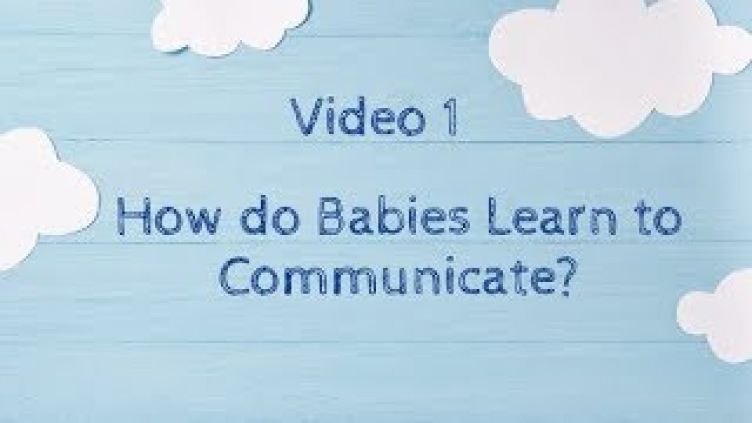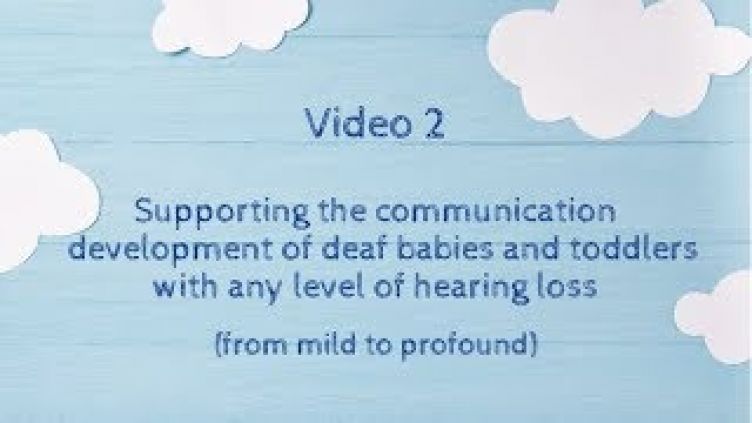Professor Danielle Matthews
Department of Psychology
Professor of Psychology


+44 114 222 6548
Full contact details
Department of Psychology
Interdisciplinary Centre of the Social Sciences (ICOSS)
219 Portobello
Sheffield
S1 4DP
- Profile
-
I research how children learn to talk, in particular how infants and young children learn from experience to use words and grammar in a communicatively effective way.
Video for parents: how do babies learn to communicate?
Babies communicate long before they say their first words. This video highlights some of the major steps on the path to language.
National Deaf Children's Society video series: Supporting communicative development for babies with any level of hearing loss
With the help of a large group of families, we made these videos to help parents to support communicative development from birth to two years. Find out more on the NDCS website.
See the rest of the videos about Supporting Communication with Deaf Babies and Toddlers
We have also been supporting the development of the wonderful new resources at BBC Education's Tiny Happy People site. Check them out here!
If you would like to take part in studies with your child, please see the Sheffield Cognitive Development Research Group page and volunteer.
- Research interests
-
Pragmatic development
Examples of pragmatic abilities that I have been interested in include children’s ability to:
- point and vocalise to direct another person’s attention
- repair failed communicative exchanges
- adapt referring expressions to their interlocutor’s perceptual state and the prior discourse
- produce speech that adheres to Greenfield’s Principle of Informativity
- manage given and new information in conversation
- produce narratives (talk about events removed in space and time)
- form referential pacts
- resolve anaphoric pronouns
- learn the function of plurifunctional words like ´the´ and `a´ (that are so hard for non native speakers of English to master)
- seek out contextual information to explain a speaker’s unexpected use of a given expression
- make global and local inferences when understanding a story book
- hold a conversation (work with Kirsten Abbot-Smith)
My current research is concerned with the learning mechanisms that allow the development of a broad set of pragmatic abilities. We are interested in how conversational experience (that can differ as a function of, e.g., deafness) explains pragmatic development, and what the consequences are for later outcomes and social wellbeing.
Language development and deafness
The development of communication and language is at risk for most deaf babies and young children. We have been investigating how early interaction can support development. See our video series above!
Socio-economic circumstances and language development
Upon moving to Sheffield, I became interested in the relation between social disadvantages and language development. Although there are well established correlations, it is not well understood why this is so and there is relatively little evidence about what practical steps could be taken to promote preschool language development so all children arrive at school with the language skills that can help them to thrive. I'm interested in using properly controlled intervention studies to test causal hypotheses. We are currently working to answer questions such as:
To what extent are different measures of socio-economic circumstance correlated with measures of language learning?
How are different caregiver approaches to supporting language development associated with socio-economic circumstances?
Can we support early caregiver-child interaction and mitigate the risk of language delay associated with social disadvantage?
Do early interventions work and are they a good idea?
How do SEC differences in different cultures around the world compare?
Word learning
With former PhD students Ed Donnellan and Michelle McGillion, I have investigated how communicative skills in early infancy, namely gaze-coordinated vocalisations and gestures, combine with caregiver responses to predict individual differences in word learning.
The learnability of grammar
Part of my PhD and later work with Colin Bannard was designed to contribute to the learnability debate in grammatical development. The aim here is to explain how the cognitive biases children bring to language acquisition interact with properties of the ambient language(s) to shape development.
- Publications
-
Show: Featured publications All publications
Featured publications
Journal articles
- Assessing a video-based intervention to promote parent communication strategies with a deaf infant: a feasibility and acceptability study. Journal of Clinical Medicine, 11(18).


- Does early child language predict internalizing symptoms in adolescence? An investigation in two birth cohorts born 30 years apart. Child Development. View this article in WRRO


- Early Pragmatics in Deaf and Hard of Hearing Infants. Pediatrics, 146(Supplement 3), S262-S269. View this article in WRRO


- Pragmatics development in deaf and hard of hearing children: a call to action. Pediatrics, 146(Supplement 3), S310-S315.


- Infants’ intentionally communicative vocalizations elicit responses from caregivers and are the best predictors of the transition to language: A longitudinal investigation of infants’ vocalizations, gestures and word production. Developmental Science, 23(1). View this article in WRRO


- The Understanding of Communicative Intentions in Children with Severe-to-Profound Hearing Loss. The Journal of Deaf Studies and Deaf Education. View this article in WRRO


- Individual differences in children’s pragmatic ability: A review of associations with formal language, social cognition, and executive functions. Language Learning and Development. View this article in WRRO


- A randomised controlled trial to test the effect of promoting caregiver contingent talk on language development in infants from diverse socioeconomic status backgrounds. Journal of Child Psychology and Psychiatry, 58(10), 1122-1131. View this article in WRRO


- What’s Worth Talking About? Information Theory Reveals How Children Balance Informativeness and Ease of Production. Psychological Science, 28(7), 954-966. View this article in WRRO


- What Paves the Way to Conventional Language? The Predictive Value of Babble, Pointing, and Socioeconomic Status. Child Development, 88(1), 156-166. View this article in WRRO


- Supporting Early Vocabulary Development: What Sort of Responsiveness Matters?. IEEE Transactions on Autonomous Mental Development, 5(3), 240-248.


- How do 3- and 5-year-olds respond to under- and over-informative utterances?. Journal of Pragmatics, 59, 26-39.


- Origins of the human pointing gesture: A training study. Developmental Science, 15(6), 817-829.


- What's in a manner of speaking? Children's sensitivity to partner-specific referential precedents.. Developmental Psychology, 46(4), 749-760.


- Children's Production of Unfamiliar Word Sequences Is Predicted by Positional Variability and Latent Classes in a Large Sample of Child-Directed Speech. Cognitive Science, 34(3), 465-488.


- Stored word sequences in language learning - The effect of familiarity on children's repetition of four-word combinations. Psychological Science, 19(3), 241-248.


- How toddlers and preschoolers learn to uniquely identify referents for others: a training study.. Child Development, 78(6), 1744-1759.


All publications
Books
Journal articles
- Impaired communication ability in SOX11 syndrome. Journal of Intellectual Disability Research. View this article in WRRO


- Towards an evidence-based approach to fostering collaborative conversation in mainstream primary classrooms: Response to commentators. First Language.


- Topic maintenance in social conversation: What children need to learn and evidence this can be taught. First Language, 014272372311726-014272372311726.


- Assessing a video-based intervention to promote parent communication strategies with a deaf infant: a feasibility and acceptability study. Journal of Clinical Medicine, 11(18).


- The role of mealtimes in fostering language development and aligning home and school learning : protocol for a multi-method study of preschool children in rural Kenya and Zambia. JMIR Research Protocols, 11(7).


- Qualitative accounts of school-aged children’s diets during the COVID-19 pandemic in rural, Central, Kenya. Nutrients, 13(10).


- How do 3-year-olds use relevance inferencing to interpret indirect speech?. First Language. View this article in WRRO


- Does early child language predict internalizing symptoms in adolescence? An investigation in two birth cohorts born 30 years apart. Child Development. View this article in WRRO


- Early Pragmatics in Deaf and Hard of Hearing Infants. Pediatrics, 146(Supplement 3), S262-S269. View this article in WRRO


- Pragmatics development in deaf and hard of hearing children: a call to action. Pediatrics, 146(Supplement 3), S310-S315.


- The role of executive functions in socioeconomic attainment gaps : results from a randomized controlled trial. Child Development. View this article in WRRO


- ‘What’s new for you?’: Interlocutor-specific perspective-taking and language interpretation in autistic and neuro-typical children. Research in Autism Spectrum Disorders, 70. View this article in WRRO


- Infants’ intentionally communicative vocalizations elicit responses from caregivers and are the best predictors of the transition to language: A longitudinal investigation of infants’ vocalizations, gestures and word production. Developmental Science, 23(1). View this article in WRRO


- Can inferencing be trained in preschoolers using shared book-reading? A randomised controlled trial of parents’ inference-eliciting questions on oral inferencing ability. Journal of Child Language. View this article in WRRO


- The Understanding of Communicative Intentions in Children with Severe-to-Profound Hearing Loss. The Journal of Deaf Studies and Deaf Education. View this article in WRRO


- Individual differences in children’s pragmatic ability: A review of associations with formal language, social cognition, and executive functions. Language Learning and Development. View this article in WRRO


- Using virtual environments to investigate wayfinding in 8- to 12-year-olds and adults. Journal of Experimental Child Psychology, 166, 178-189. View this article in WRRO


- How children learn to produce appropriate referring expressions in narratives: the role of clarification requests and modeling.. Journal of Child Language, 1-17. View this article in WRRO


- A randomised controlled trial to test the effect of promoting caregiver contingent talk on language development in infants from diverse socioeconomic status backgrounds. Journal of Child Psychology and Psychiatry, 58(10), 1122-1131. View this article in WRRO


- What’s Worth Talking About? Information Theory Reveals How Children Balance Informativeness and Ease of Production. Psychological Science, 28(7), 954-966. View this article in WRRO


- What Paves the Way to Conventional Language? The Predictive Value of Babble, Pointing, and Socioeconomic Status. Child Development, 88(1), 156-166. View this article in WRRO


- All about…: contingent talk. Nursery World, 2016(25), 17-20. View this article in WRRO


- The development of wayfinding abilities in children: Learning routes with and without landmarks. Journal of Environmental Psychology, 41, 74-80. View this article in WRRO


- Supporting Early Vocabulary Development: What Sort of Responsiveness Matters?. IEEE Transactions on Autonomous Mental Development, 5(3), 240-248.


- Hearing relative clauses boosts relative clause usage (and referential clarity) in young Turkish language learners.. Applied Psycholinguistics, 1-28.


- How do 3- and 5-year-olds respond to under- and over-informative utterances?. Journal of Pragmatics, 59, 26-39.


- Two- and four-year-olds learn to adapt referring expressions to context: effects of distracters and feedback on referential communication.. Topics in Cognitive Science, 4(2), 184-210.


- Origins of the human pointing gesture: A training study. Developmental Science, 15(6), 817-829.


- What's in a manner of speaking? Children's sensitivity to partner-specific referential precedents.. Developmental Psychology, 46(4), 749-760.


- Children's Production of Unfamiliar Word Sequences Is Predicted by Positional Variability and Latent Classes in a Large Sample of Child-Directed Speech. Cognitive Science, 34(3), 465-488.


- Analyzing linguistic data: A practical introduction to statistics using R.. Journal of Child Language, 37(2), 465-470.


- Jean Berko Gleason (ed.), The development of language, 6th edn. Boston, MA: Pearson, 2005. Pp. 516. ISBN 0205394140. - Robert E. Owens, Language development: An introduction, 7th edn. Boston, MA: Pearson, 2008. Pp. 509. ISBN 0023901810. - William O'Grady, How children learn language. Cambridge: Cambridge University Press, 2005. Pp. 248. ISBN 0521531926 (paperback).. Journal of Child Language, 37(1), 222-228.


- Three-year-olds are sensitive to semantic prominence during online language comprehension: A visual world study of pronoun resolution. Language and Cognitive Processes, 25(1), 115-129.


- Langauage development: An introduction, 7th edition.. Journal of Child Language, 37(1), 222-228.


- Pronoun co-referencing errors: challenges for generativist and usage-based accounts.. Cognitive Linguistics, 20(3), 599-626.


- Stored word sequences in language learning - The effect of familiarity on children's repetition of four-word combinations. Psychological Science, 19(3), 241-248.


- How toddlers and preschoolers learn to uniquely identify referents for others: a training study.. Child Development, 78(6), 1744-1759.


- French children's use and correction of weird word orders: a constructivist account.. Journal of Child Language, 34(2), 381-409.


- Why language matters for theory of mind. Journal of Child Language, 33(4), 910-916.


- Errors of omission in English-speaking children's production of plurals and the past tense: The effects of frequency, phonology, and competition. Cognitive Science, 30(6), 1027-1052.


- The effect of perceptual availability and prior discourse on young children's use of referring expressions. Applied Psycholinguistics, 27(3), 403-422. View this article in WRRO


- The role of frequency in the acquisition of English word order. Cognitive Development, 20(1), 121-136.


- Pragmatic development in deaf and hard of hearing children: A review. Deafness & Education International, 1-18.


- Encouraging 5-year olds to attend to landmarks: a way to improve children's wayfinding strategies in a virtual environment. Frontiers in Psychology, 6. View this article in WRRO


- How do three-year-olds use relevance inferencing to interpret indirect speech.


- Developmental Language Disorder (DLD) in Young People Leaving Care in England: A Study Profiling the Language, Literacy and Communication Abilities of Young People Transitioning from Care to Independence. International Journal of Environmental Research and Public Health, 18(8), 4107-4107.


- Tracking the relation between different dimensions of socio-economic circumstance and vocabulary across developmental and historical time.


Chapters
- Grammar, The Curated Reference Collection in Neuroscience and Biobehavioral Psychology (pp. 38-50).


- First language acquisition, Handbook of Cognitive Linguistics (pp. 389-409).


- Referential pacts in child language development, Language in Interaction (pp. 175-190). John Benjamins Publishing Company


- The communicative infant from 0-18 months: The social-cognitive foundations of pragmatic development. In Matthews D (Ed.), Pragmatic Development in First Language Acquisition John Benjamins


- Referential communication In Kempe V & Brooks P (Ed.), Encyclopaedia of Language Development Sage


- Two- and 3-year-olds’ linguistic generalizations are prudent adaptations to the language they hear. In Arnon I & Clark EV (Ed.), Experience, Variation and Generalization: Learning a first language. (pp. 153-166). John Benjamins Publishing Company


- Grammar. In Haith M & Benson J (Ed.), Language, Memory, and Cognition in Infancy and Early Childhood. (pp. 192-204). Academic Press Inc


- Grammar In Haith M & Benson J (Ed.), The Encyclopaedia of Infant and Early Childhood Development. (pp. 38-50). Academic Press Inc


- Grammar, Encyclopedia of Infant and Early Childhood Development, Three-Volume Set (pp. V2-38-V2-50).


Preprints
- A low-intensity, digital intervention influences infant pre-linguistic communication and caregiver responses at 12 months: Evidence from an RCT, Center for Open Science.


- The Role of Mealtimes in Fostering Language Development and Aligning Home and School Learning: Protocol for a Multi-Method Study of Preschool Children in Rural Kenya and Zambia (Preprint), JMIR Publications Inc..


- Does early child language predict internalizing symptoms in adolescence? An investigation in two birth cohorts born 30 years apart.


- Can inferencing be trained in preschoolers using shared book reading? A randomised controlled trial of parents’ inference-eliciting questions on oral inferencing ability..


- Assessing a video-based intervention to promote parent communication strategies with a deaf infant: a feasibility and acceptability study. Journal of Clinical Medicine, 11(18).
- Research group
-
Current PhD students
Rosemary Wareham-O’Brien - How deaf infants learn to communicate during parent-infant interaction.
Current researchers
Gideon Salter - Do video materials help parents to support infant development? Testing effects on infant communication.
Kiera Solaiman - Research Assistant Do video materials help parents to support infant development?
Former PhD students
Emma Thornton
- Grants
-
Funded projects
- BBC Education, D. Matthews (PI) and J. Pine 2021-2023. Evaluation of the Tiny Happy People programme.
- Leverhulme Trust, K. Abbott Smith (PI), Matthews, Leekham, (2020-23) The cognitive constraints on children’s ability to manage a conversation topic.
- UKRI GCRF L. Shapiro (PI), Farrow, Wadende, Matthews, Mooya & Koteng (2019-2022) A school closer to home: using mealtimes to foster language development, improve girls' nutrition and align home and school in rural Kenya and Zambia
- British Academy Mid-Career Fellowship, D. Matthews, (2018-19) Pragmatic Development: How children learn to use language in social interaction.
- University of Sheffield Legacy, D. Matthews (2018-19) Supporting communicative development in deaf babies with any level of hearing loss.
- ESRC, Large Grant to C. Rowland (PI) D. Matthews, J. Billington, R. Levy, T Cameron-Faulkner, A. Hesketh, C. Davies (co-PIs), (2015-2018) How to promote children's language development using family-based shared book reading.
- British Academy, Small Research Grant to D. Matthews & C. Bannard (co-PIs), (2014-2016) What role does statistical learning play in children’s pragmatic development?
- Nuffield Foundation Foundations for Learning Grant to D. Matthews (PI), J. Herbert & J. Pine (2011-2012) Does promoting parents’ contingent talk with their infants benefit language development?
- British Academy, Small Research Grant: to D. Matthews (PI), J. Herbert & J. Pine (2011-2012) Does promoting parents’ engagement with their infants benefit language development?
- British Academy UK-Latin America and the Caribbean Link Scheme to D. Matthews (PI) & A. Carmiol (2010-2012) Communicative Development: A cross-linguistic, cross-cultural comparison.
- Teaching activities
-
Teaching: Teaching: Undergraduate: Developmental Psychology (2nd year); Pragmatic Development (3rd year); BSc Research Project.
Postgraduate: Ethics; Current Issues in Psychological Research; MSc Research Project.
Admin: Research Cluster Lead for Cognition and Neuroscience
- PhD Opportunities
I am happy to receive applications for PhD study in my area of research.
We advertise PhD opportunities (Funded or Self-Funded) on FindAPhD.com
For further information, please see the department PhD Opportunities page.


